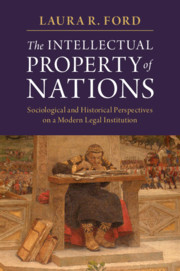 The Intellectual Property of Nations
The Intellectual Property of Nations Book contents
- The Intellectual Property of Nations
- The Intellectual Property of Nations
- Copyright page
- Contents
- Preface and Acknowledgments
- Introduction
- 1 Legal Institutions and Social Power
- 2 Legal Orders and Social Performance
- 3 Instruments of Legal Power in the Roman Republic
- 4 Semantic Legal Ordering
- 5 Cultural Transformations
- 6 Privileges and Immunities in a Sacramentalizing Order
- 7 Administrative Kingship and Covenantal Bonds
- 8 Intellectual Property in a Nationalizing Order
- 9 Cultural Transformations
- 10 Semantic Legal Ordering
- 11 Instruments of Legal Power in the American Republic
- 12 Legal Orders and Social Performance
- Conclusion The Intellectual Property of Nations
- Index
4 - Semantic Legal Ordering
Idealizing Roman Law
Published online by Cambridge University Press: 04 June 2021
- The Intellectual Property of Nations
- The Intellectual Property of Nations
- Copyright page
- Contents
- Preface and Acknowledgments
- Introduction
- 1 Legal Institutions and Social Power
- 2 Legal Orders and Social Performance
- 3 Instruments of Legal Power in the Roman Republic
- 4 Semantic Legal Ordering
- 5 Cultural Transformations
- 6 Privileges and Immunities in a Sacramentalizing Order
- 7 Administrative Kingship and Covenantal Bonds
- 8 Intellectual Property in a Nationalizing Order
- 9 Cultural Transformations
- 10 Semantic Legal Ordering
- 11 Instruments of Legal Power in the American Republic
- 12 Legal Orders and Social Performance
- Conclusion The Intellectual Property of Nations
- Index
Summary
This chapter focuses on the period of Roman history in which the empire emerged. The famous historical personalities of Caesar and Cicero are sketched to contrast two prevailing methods of acquiring social power in ancient Rome: charismatic leadership of soldiers, as exemplified by Caesar, and rhetorical persuasion in accordance with formalistic rules, as exemplified by Cicero. In one published speech by Cicero we see very close counterparts to intellectual property in ancient Rome: a situation in which a foreign-born poet has been granted Roman citizenship in order to reward his poetic services to the state, described metaphorically as property. We then see how this basic pattern of granting privileges in order to inventivize valued behaviors was systematically utilized by Roman emperors, as they sought to transform the institutional structures of the republic into an institutional structure over which they exercised more autocratic levels of control. Within the classical, imperial framework of Roman law, jurists recognized important forerunners to intellectual property. Many centuries later, these would become the foundation for modern intellectual property.
Keywords
- Type
- Chapter
- Information
- The Intellectual Property of NationsSociological and Historical Perspectives on a Modern Legal Institution, pp. 114 - 143Publisher: Cambridge University PressPrint publication year: 2021
